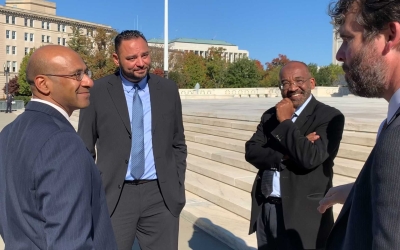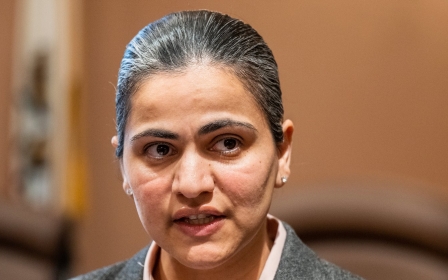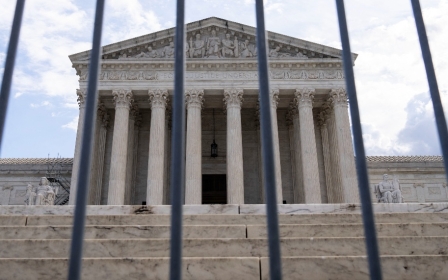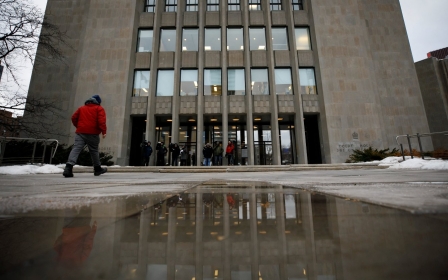'We don't need secret evidence': California Muslims argue FBI spying case should move forward
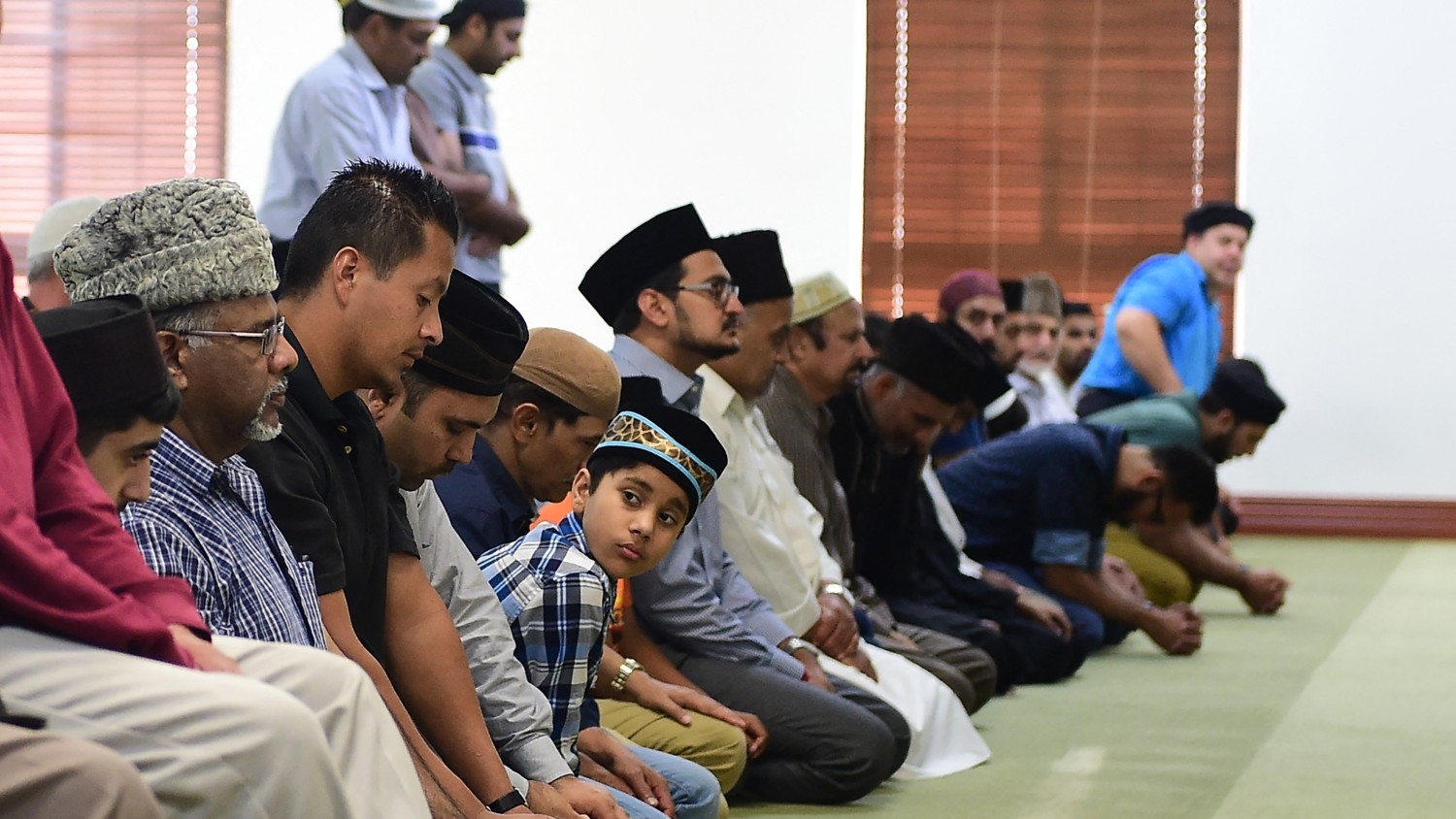
After more than a decade of shuttling through the US court system, three Muslim men who fell victim to the FBI's covert surveillance programme are back in court arguing that their case against the government should continue to move forward.
During a hearing on Thursday at the US Court of Appeals for the 9th Circuit, Peter Bibring, the lawyer representing the Muslim men, argued that the court should hear the case despite the government's arguments the case should be dismissed based on the state secrets privilege.
"We've taken the position that we don't need any discovery into the secret evidence," said Bibring, saying that they could present their arguments with non-privileged evidence.
Judge Marsha Berzon, one of the three judges listening to the arguments, voiced scepticism of the government's defence around state secrets being a reason for altogether throwing out the case.
"The underlying problem here is that there is an inherent conflict of interest by the government. They're both the defender and protector of the interests and having no eyes on that is very troublesome," Berzon said during the hearing that was streamed on YouTube.
New MEE newsletter: Jerusalem Dispatch
Sign up to get the latest insights and analysis on Israel-Palestine, alongside Turkey Unpacked and other MEE newsletters
"The notion that things are going to leak out that haven't leaked out in the last 20 years is not very believable."
In response to the government's arguments, Judge Berzon said it is rare for cases to be dismissed at this stage of litigation.
"That's our problem here. I mean, how much do we hamper both sides because of this problem or do we just close the courthouse door altogether and say we're not going to bother?"
Operation Flex
In the early 2000s, the growing Muslim community in southern California was just getting on its feet both financially and socially following the 9/11 attacks and the vitriol and Islamophobia that Muslims in the US faced in the years after.
By 2004, the city of Irvine, California, had its own mosque, the Islamic Centre of Irvine, which was regularly seeing a thousand people attend its weekly Friday prayer services.
However, in the next few years, the entire social fabric of the community was ruptured after a paid FBI informant infiltrated and began working to entrap young Muslim men.
Between 2006 and 2007, the FBI sent Craig Monteilh, otherwise known to many in the community as Farouk al-Aziz, to spy on California's Orange County - home to multiple mosques and 120,000 Muslims at the time. The affair was known as Operation Flex.
Years later in 2011, Yassir Fazaga, an imam at the Orange County Islamic Foundation, and Ali Uddin Malik and Yasser Abdelrahim, who both attended the Islamic Center of Irvine, filed a lawsuit against the government.
The three men accused the FBI of using an informant to infiltrate mosques in southern California and spy on Muslim Americans, including religious leaders, on the basis of their religion.
Among the issues the plaintiffs have is that Monteilh had planted recording devices in the office at the mosque, and had brought up violence and jihad to young men in the community and asked them to join him in violent plots on US soil
In one case, Monteilh went with two Muslims in the community on a drive to a mosque in Culver City, where he asked them to join in an attack on US soil.
Despite trying to convince him against the act and also telling him that they would not get involved in any plots, one of the men, Ahmadullah Niazi, was later arrested on perjury and immigration-related charges.
While the charges were dropped, his entire social circle distanced themselves from Niazi, members of the community previously told MEE.
By targeting Muslims, the men say the FBI's alleged actions constitute religious discrimination in violation of the US Constitution's First Amendment, as well as violating the Fourth Amendment prohibition on unreasonable searches and seizures.
State secrets
The plaintiffs argue that they should be given the opportunity to challenge the unlawful surveillance and targeting of the Muslim-American community.
The government called for the case to be dismissed by asserting the "state-secrets" privilege, saying that defending the case in court would threaten the disclosure of information that could pose a threat to national security.
After the case was dismissed at the district level in 2012, the Ninth Circuit ruled in 2019 that the case could move forward on the basis of the Foreign Intelligence Surveillance Act (FISA), which governs how surveillance-related evidence can be used in court.
The Supreme Court in March 2022 unanimously overturned the appeals court ruling in favour of the men, determining that the court misapplied the law, and ordered the lower court to reassess whether the case can move forward based on the state secret privilege.
Bibring, the lawyer on behalf of the plaintiffs, argued that the state secrets privilege does not authorise dismissal of this case. The privileged material in question can be removed without preventing them from presenting their own non-secret evidence, according to Bibring.
"The government cannot have its cake and eat it too. It can claim that it still needs to keep secret information about this 17-year-old investigation of law-abiding Southern California residents, or it can try to defend its dragnet surveillance practices in federal court," Ahilan Arulanantham, counsel for plaintiffs and faculty co-director of the Center for Immigration Law and Policy at UCLA School of Law, said in a statement given to MEE after the hearing.
"But it cannot hide behind the shield of secrecy and simultaneously avoid any accountability for its actions."
Middle East Eye delivers independent and unrivalled coverage and analysis of the Middle East, North Africa and beyond. To learn more about republishing this content and the associated fees, please fill out this form. More about MEE can be found here.


